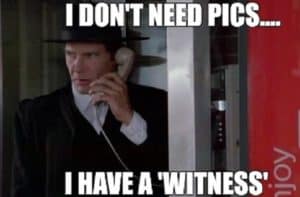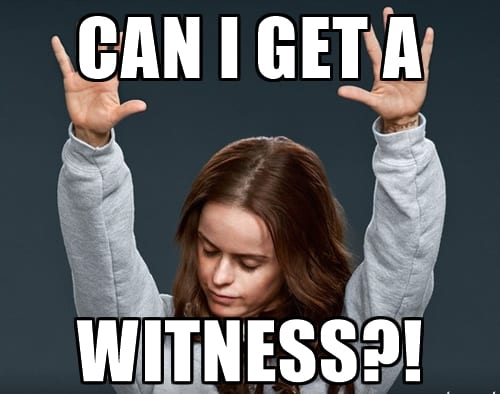A witness in a child custody case is a reliable link between the judge and your case.
He or she helps the court make a better decision based on facts that they have observed over time.
A witness will be asked questions regarding the relationship of the child and the parent, the character of the parents, and other issues that may emanate in the hearing or trial process.
Since witnesses are so crucial in a child custody case, you will need to prepare them accordingly. Your attorney will guide you on the type of witnesses to choose depending on the nature of your case.
Before discussing your witnesses with your lawyer, this information will help you know who can be a witness in a child custody case for a better outcome.
Understanding the role of a Witness
The court may want to accept testimony or affidavits from witnesses to determine the legitimacy of claims and allegations by both parties.
It can be difficult to make a judgment based on the facts and evidence presented by the parties. This is where witnesses come in handy.
Witnesses can help the court understand how you will care for the child or children in terms of:

- Providing a comfortable and safe place to live.
- Meeting their educational requirements and needs.
- Providing welfare such as food, clothing, and shelter.
- Emotional support and daily care.
Types of witnesses
Choose your witness based on the nature of your case.
Expert witness
If your case involves complicated issues such as abuse, you may include expert witnesses who will prove to the court, with hard facts, any trauma that you or the child have faced from the other partner.
An expert witness is a specialized person who will testify to the court based on the findings from his or her area of specialization. The other types of witnesses include:
Character witness
A character witness is usually someone who has known one or both parties in the case long enough or well enough to speak to their character and behavior.
He or she will help the court understand the personality traits of the parent in the case. It can be a neighbor, family member, or friend.
Lay witness
This is someone who gives the latest facts regarding what transpired before divorce or separation and is based on primary facts.
Whether there was physical abuse or argument, and who did what.
This is the person with first-hand information and can help the court understand what other witnesses may not have seen or witnessed.
Who Can Be a Witness in a Child Custody Case?
You don’t need a lot of witnesses to win your child custody case. Just focus on the quality of your witnesses. Anyone who can contribute positive accurate knowledge to the court on your behalf is a good witness. These can include:
Neighbors and family members
Neighbors or family members can be the best witnesses in a child custody case. They are in a better position to shed light on deep issues about one parent or both parents.
Neighbors can testify on the character and behavior of both parents.
Family members can also be good witnesses but sometimes, the court may see them as too biased.
They may be seen to support you to win, regardless of the interests of the children.
A family member who is related to the other parent and can stand to be your witness can be better than your immediate relative. Just be careful of their intentions as stated above.
Teachers or childcare providers
Teachers and daycare providers are like half-parents.
They already know the relationship you have with your child or children, and the other parent as well. They usually can tell who is more concerned about the welfare of the child than the other.
They can be very suitable witnesses for a child custody case and can help the court understand the relationship and the welfare that each parent offers to the children while in school.
They may also provide hard facts on who has been providing fees for the child and other welfare needs. In addition to that, they can testify on visitation of the child while in school, and who drops and picks them up.
Colleagues and friends
Your work colleagues or friends may also be part of your story.
If you have been taking leave to attend to your child or children, your colleagues can testify. They may also have interacted with the children and are aware of the child’s progress and stability.
Psychologists and therapists
Psychologists and therapists will give expert opinions to the court on any issue regarding mental health.
If one parent has been suffering mental problems, these experts can tell the court, based on their findings after some sessions of counseling or diagnosis.
This can also happen when the court refers one or both parents to an expert to examine their mental health states.
Medical providers
Medical providers can testify on how the parent has been attending appointments and taking care of the medical expenses of the child.
They can also provide facts about the health and fitness and whether the parent has been involved in drug and substance abuse or not.
In some instances, a medical expert may have hard evidence regarding physical abuse and the medications that the other parent has undertaken to recover.
You may not have access to this information, but the court can request it from the parent.
Other witnesses
If the other parent has been abusive to the child to an extent of inflicting pain through physical abuse, other witnesses may come in handy.
These may include the police, social workers, or clergy.
The other witnesses who may be helpful to the court may include babysitters and parents of any half-sibling among others.

Conclusion
Understanding who can be a favorable witness in a child custody case is the first milestone towards winning your case.
It is important to focus on choosing quality rather than quantity.
You do not need to dwell on the number of witnesses but the weight of their facts regarding the custody case.





